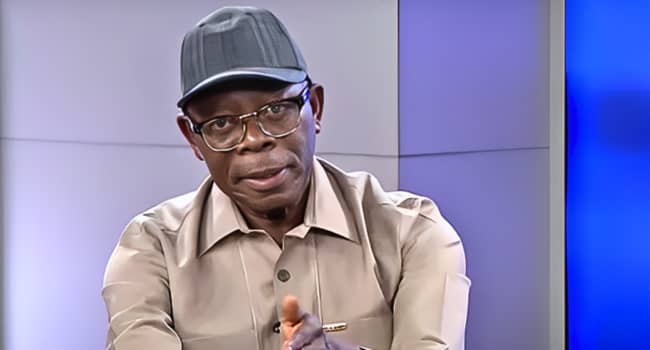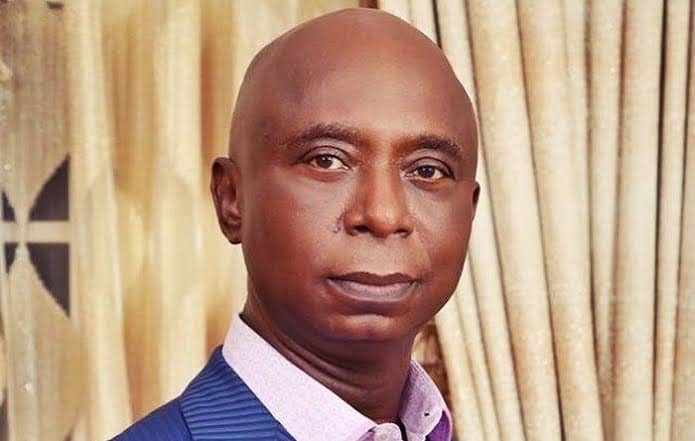Senator Adams Oshiomhole has publicly blamed the administration of former President Muhammadu Buhari for the current collapse of the naira, citing excessive money printing as a key factor behind Nigeria’s economic instability. Oshiomhole made the statement on Friday during an interview, according to a report by Channels Television on June 28, 2025.
The former Edo State governor and ex-national chairman of the All Progressives Congress (APC) said the Buhari government consistently engaged in unchecked monetary expansion that severely undermined the value of Nigeria’s currency. According to Oshiomhole, this practice flooded the economy with liquidity without corresponding productivity, leading to inflationary pressures and erosion of the naira’s purchasing power.
He stated that “reckless” money printing by the Central Bank of Nigeria (CBN) under Buhari’s tenure was unsustainable and ultimately led to the current economic hardships facing the country. Oshiomhole explained that printing money without creating real value led to too much naira chasing too few goods, a classic recipe for inflation and currency devaluation.
Oshiomhole, now a senator representing Edo North, remarked that many of the economic policies under Buhari were not grounded in long-term financial sustainability. He emphasized that while President Bola Tinubu’s administration is taking steps to stabilize the economy, it inherited deep structural problems worsened by the fiscal irresponsibility of the previous government.
According to the senator, the Buhari administration repeatedly financed budget deficits through monetary accommodation by the central bank, rather than implementing the tough reforms needed to address Nigeria’s economic challenges. He said the consequences of such decisions are now manifesting in rising inflation, high debt servicing costs, and the continued depreciation of the naira.
He also criticized the former CBN leadership under Godwin Emefiele, accusing it of abandoning its core responsibility of maintaining monetary stability. Oshiomhole claimed that the central bank had become an enabler of unsound fiscal practices, approving indiscriminate financing of government spending without adequate checks or transparency.
The senator maintained that President Tinubu is now left to clean up the mess, having to introduce painful reforms to restore macroeconomic balance. He cited the removal of fuel subsidies and unification of the exchange rate as examples of necessary but difficult steps being taken to reverse the damage.
Oshiomhole’s comments come at a time of heightened economic anxiety in Nigeria, as the country grapples with a volatile exchange rate, high inflation, and widespread public discontent over the rising cost of living. The naira has suffered significant depreciation over the past two years, with analysts linking its poor performance to both external shocks and internal policy missteps.
Although the Buhari administration had frequently defended its economic decisions during its tenure, critics have long argued that the government relied excessively on borrowing and short-term fixes rather than structural reforms. The former president and his aides had blamed global economic conditions, the COVID-19 pandemic, and oil market volatility for Nigeria’s financial woes.
However, Oshiomhole dismissed these justifications, stating that while external factors played a role, the damage done through domestic monetary mismanagement was avoidable and largely self-inflicted. He called for a thorough review of past fiscal and monetary practices and urged the current administration to strengthen institutions like the CBN to prevent a recurrence.
He also encouraged President Tinubu to maintain transparency in economic policy implementation and to keep engaging with Nigerians to build public confidence in the reform process. Oshiomhole acknowledged that the current economic environment is difficult but insisted that the country must break away from the habits of unrestrained deficit financing and poor financial discipline.
The senator’s remarks add to growing intra-party criticisms of the Buhari era, with several APC figures now openly distancing themselves from the former administration’s economic legacy. As Nigeria navigates one of its toughest economic periods in recent history, the debate over the causes—and consequences—of the naira’s collapse continues to intensify.





